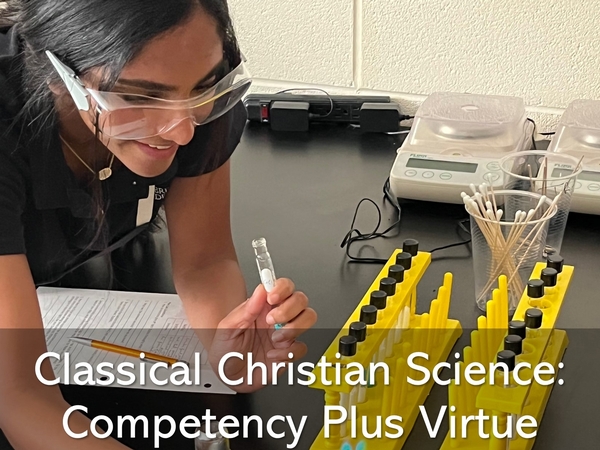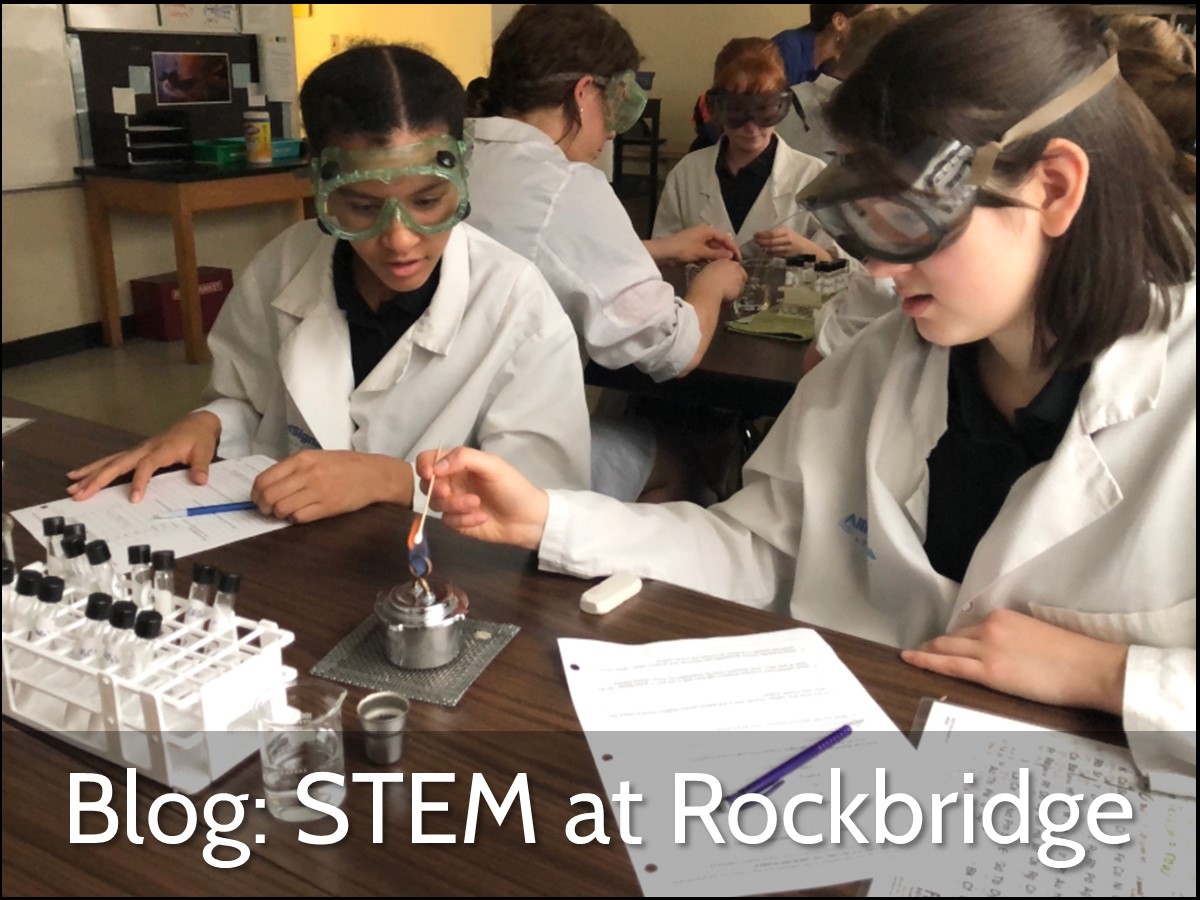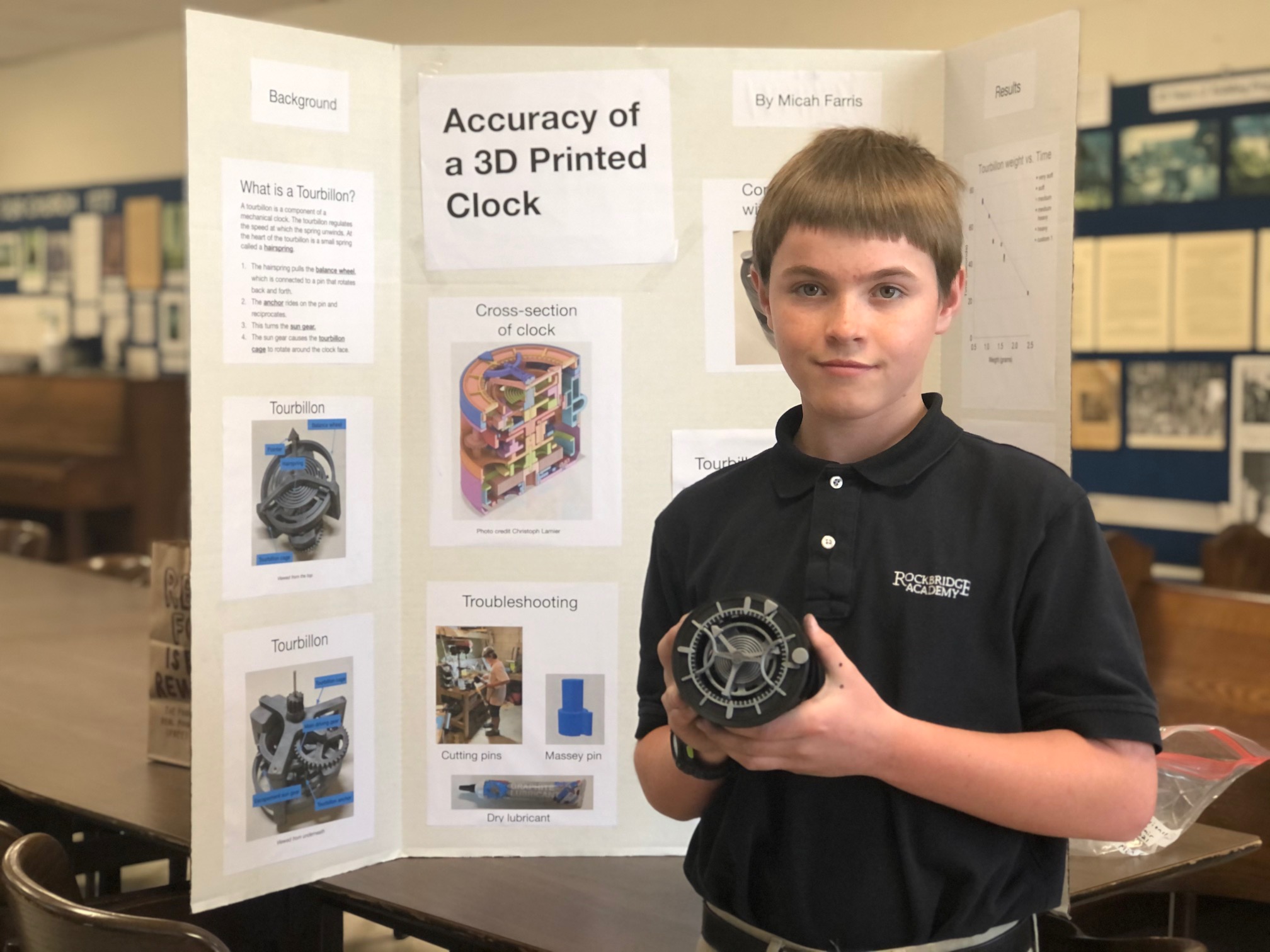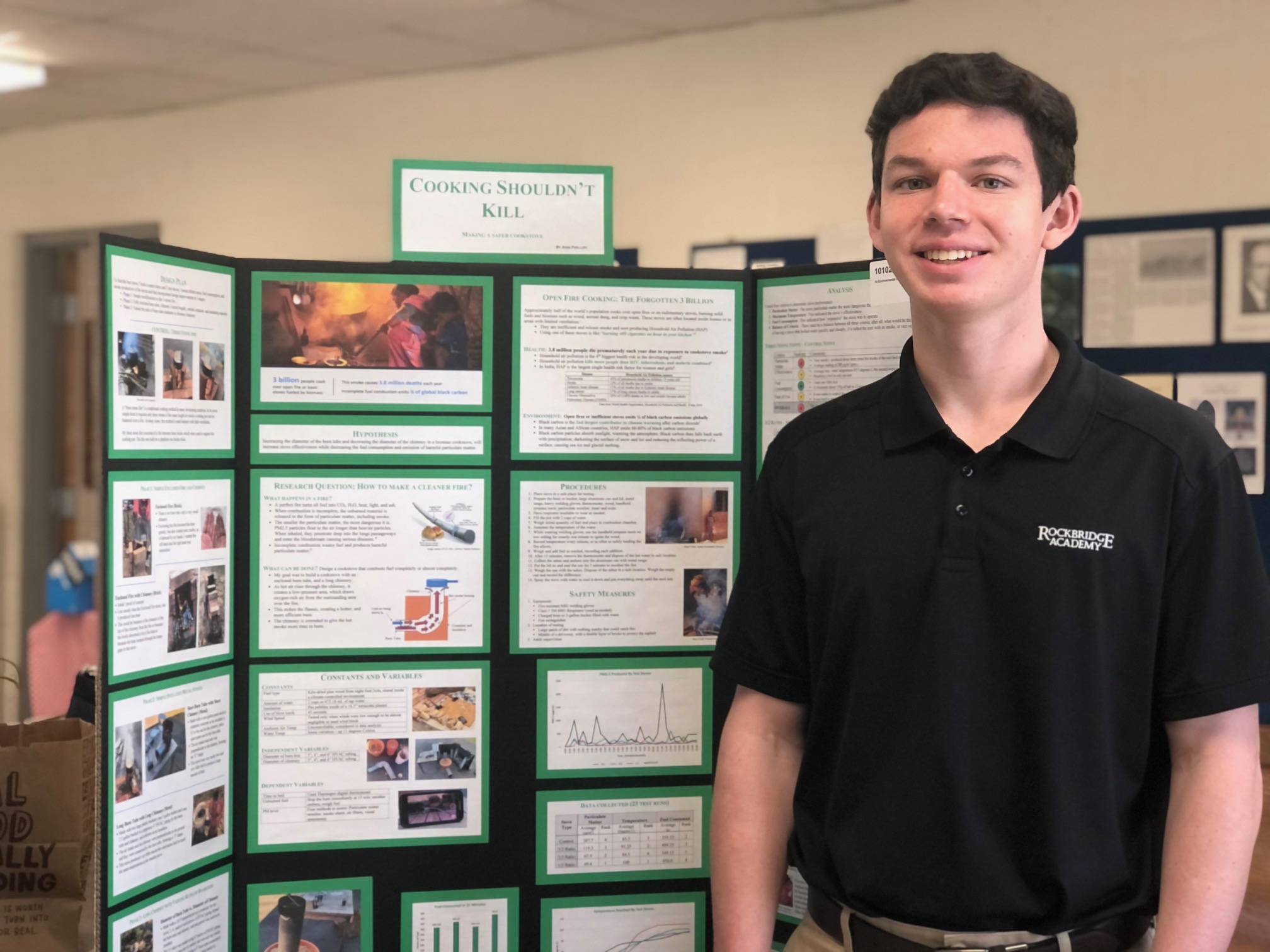Rockbridge Academy Blog
Classical Christian Science: Competency Plus Virtue

"Science is the search for the truth.”
– Linus Pauling, founder of Quantum Chemistry & Molecular Biology
Imagine a medical student memorizing cardiovascular system pathology for his licensing exam. Picture a pilot polishing up her landing skills in an aircraft simulator. Think of a teenage boy playing a car-racing video game. When does the medical student learn compassion for his patients? How does the pilot train for the courage that gives her a steady hand? Which game module teaches the adolescent driver good judgment? All three scenarios present a person who has trained for hours, weeks, or even years honing the skills necessary for their vocation; yet all three are missing elements essential to their roles. In contrast, a classical Christian education seeks to develop the whole person from competency to relationship to virtue. At Rockbridge, science classes are no exception.
Consider a scientist who has completed all the necessary education to be a leader in her field. She is familiar with cutting-edge research, and she has the analytical skills to design and build solutions. But in which class did she learn to appreciate the complexity of real-world problems? What research did she do on the ethics of her specialty? How much training has she had on written and oral communication to experts and decision-makers in the broader world? Modern scientists are trained to be competent, but lack preparation in interpersonal skills and moral character.
Science knowledge has exploded in the last century. The reflex response in education has been to cram more technical skills into the science classroom. In contrast, a liberal arts education is larger than the mere transmission of technical information. Modern classical science aims to combine practical knowledge with transformation of the social and personal aspects of a student’s character. As a classical Christian school, Rockbridge Academy pursues this transformation in light of biblical truths which develop the student as a bearer of the imago Dei.
In the dialectic years, students cultivate disciplined mental habits through systematic training in logic and Latin. As they move into rhetoric science, the focus shifts to developing habits in both computational and analogical thinking. While memorization and repetition are important, we eschew any method that limits learning to regurgitation of facts and algorithms in order to pass a test. Robust learning must be held in tension with contemplation, wonder, rest, and connection to the narrative of science, the story through which we see God’s incredible creation.
Do nothing from selfish ambition or conceit, but in humility count others as more significant than yourselves. Let each of you look not only to his own interests, but also to the interests of others.
– Philippians 2:3-4
The prevailing secular model for bright students seeking to make an impact on the world is a laser-like focus on areas of self-interest: grades, accolades, and individual accomplishments. As Rockbridge students build a foundation of scientific competency, we seek to create an environment which is truth-seeking for the benefit of the whole, not advantage-seeking for the benefit of the one. Rhetorical skills in speaking and writing are developed and used to teach and mentor others. Students are encouraged to ask questions about science and faith as they practice thinking deeply and putting difficult thoughts into words. They are led to see their developing abilities in the light of humility and stewardship: the humility of seeking truth rather than seeking rewards, and stewardship of the earth as we partner with God to be redeemers of culture and creation.
Foremost, our goal for the students at Rockbridge Academy is to guide their journey into full personhood. From the early days of grammar school until the final year of rhetoric, science students are encouraged to order their loves as they seek knowledge. We worship the Creator and have confidence in Him alone. We learn with boldness and purpose, not with fear of an unknown future. Our posture toward truth is one of awe as we see the Creator’s fingerprints on all of creation. We pray for students to leave these halls with every part of their education integrated into a whole, harmonious person: able to fulfill God’s call as stewards of creation, liberated in the freedom of Christ.
Robyn Kennedy has a degree in chemical engineering and a background in manufacturing and data acquisition systems. She teaches upper school science at Rockbridge Academy. Her husband is a retired Navy captain, and she and her family have served our country for many years at duty stations all over the world and around the country. She has four children and three of them are currently students at Rockbridge Academy.
STEM at Rockbridge Academy

Eighth-grader Theodore Grev had a problem. Every time he camped, his sleeping hammock gave him trouble. Setting up at night in the woods, he couldn’t see to secure the knots for his tarp covering. Sometimes the tarp would blow away in the middle of the night, leaving him cold and wet.
Something had to be done.
When he saw the invitation for the Rockbridge STEM Club (Science, Technology, Engineering, and Math), Theodore decided to turn his problem into a science project. Quarantining at home during the summer COVID shutdown, he built one configuration after another, carefully recording the amount of time it took to set up each model. He finally settled on the best one: it took 8 minutes and 30 seconds to assemble and stayed up all night without fail. This winter, he entered it the Regional Science and Engineering Expo. He and his friends have also started using it on their camping trips, with great success.
Theodore is just one of several participants in the STEM Club at Rockbridge Academy.
Other projects this year have included creating an accurate clock with a 3D printer; designing a walking robot; building a low-pollution cooking stove to save lives in the third world; and testing the safety of personal passwords. The club’s record is strong. Last year, freshman Josh Phillips took home 6 awards for his “Cooking Shouldn’t Kill” cookstove design. The year before that, junior Ryan McDowell took his computer security project to the Intel International Science and Engineering Fair (ISEF) and won a “Cyber Pioneer” honorable mention from the National Security Agency.
 How does this work at a classical, Christian school of only 165 middle and high school students? As STEM fields are promoted more heavily in the culture, classical, Christian schools—usually much smaller than their public counterparts—are often questioned about their ability to measure up.
How does this work at a classical, Christian school of only 165 middle and high school students? As STEM fields are promoted more heavily in the culture, classical, Christian schools—usually much smaller than their public counterparts—are often questioned about their ability to measure up.
At Rockbridge Academy, the curriculum includes a strong STEM track of earth science, biology, chemistry, and physics; algebra, geometry, trigonometry, and calculus; and analytical science and logic, which train students to test arguments and formulate proofs. For several years, Rockbridge students have also participated in the American Math Competition and regional and state-wide Science Olympiads, placing well in both.
The study of science and math is historically classical and Christian—grounded firmly in the liberal arts and driven by a desire to comprehend Creation. Classical educators like to quote Apple founder Steve Jobs: “Technology alone is not enough…it’s technology married with liberal arts, married with the humanities, that yields us the result that makes our hearts sing.”
“Technology alone is not enough…it’s technology married with liberal arts, married with the humanities, that yields us the result that makes our hearts sing.” Steve jobs
At Rockbridge, watching students at work DOES make the heart sing.
Cathy Phillips, a graduate of the US Naval Academy with a degree in aero engineering, started the Rockbridge STEM Club when her son Josh was entering high school. Josh had always had a scientific bent, and she wanted to provide an opportunity for students like him to pursue that bent beyond the classroom.
Mrs. Phillips sees excellence in math and the sciences as flowing naturally from a classical education, which girds students with a strong foundation in facts, then invites them to ask the “why” behind those facts—and equips them to present their findings with skill and winsomeness. She notes that classically educated students typically have a strong desire to learn and a strong background in critical thinking. This translates into excellent questions and the persevering spirit to bring their projects to completion.
This year’s participants are competing in a variety of events: the Maryland Engineering Challenge, the County Regional Science and Engineering Expo, and the Junior Science and Humanities Symposium,
Freshman Michael Grube is building a remote-controlled model cargo ship for the Maryland Engineering Challenge. He’s grappling with college-level math and nautical design, but Rockbridge has trained him in fundamental math concepts that are serving him well. Also for the Challenge, sisters Kait and Maddie Atwood are working with Sean Fitch to design and build a walking robot that walks on 2 legs over uneven terrain. And Josh Phillips created a bridge design for the “Wood Bridge Challenge” category of the competition and won first place!
Theodore Grev entered his practical hammock design in the County Regional Science and Engineering Expo. Seventh-grader Micah Farris, who has always had a bent for engineering and enjoys experimenting on his own, decided to create his own clock with a 3D printer. Both of them took 2nd place. The printing took about 100 hours, and there were long days (and nights) of assembling and disassembling the clock, testing different springs, recording the results again and again. Thankfully, he says, his training at Rockbridge had already trained him to be persistent.
 Josh Phillips, who won 6 county awards for his “Cooking Shouldn’t Kill” cookstove design last year, has improved his design and is taking it to the Junior Science and Humanities Symposium (a DOD competition) in 2021. Juniors Emma Williams and Hannah Skwarek decided to examine the effectiveness of common password security questions. After winning the approval of an Institutional Review Board, they conducted multiple interviews, collected online data from their subjects, and determined which questions offer greater security. They are off to compete on the national level.
Josh Phillips, who won 6 county awards for his “Cooking Shouldn’t Kill” cookstove design last year, has improved his design and is taking it to the Junior Science and Humanities Symposium (a DOD competition) in 2021. Juniors Emma Williams and Hannah Skwarek decided to examine the effectiveness of common password security questions. After winning the approval of an Institutional Review Board, they conducted multiple interviews, collected online data from their subjects, and determined which questions offer greater security. They are off to compete on the national level.
Writing and presenting the final project for a panel of experts is a major component of all of these competitions. Yet the students consistently expressed that that was the “easy part.” At Rockbridge, they’ve been honing those skills for years.
While small classical schools may not offer a wide array of specialized math and science classes, they do offer classes that are rigorous, deep, and integrated with one another. In a STEM world that changes with blinding speed and often denies the existence of God, classical Christian education trains adept and willing learners—all while affirming the beauty of creation and greatness of the Creator. These competitions don’t just introduce students to a STEM network of friends and colleagues; they also give them opportunities to shine the light of Christ to a world that needs Him.
